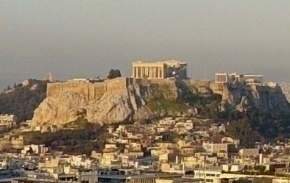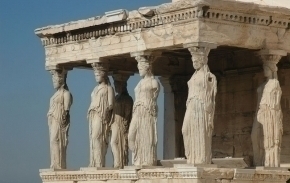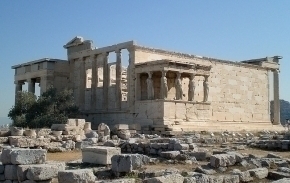 The city's history is so vast that it would hardly fit in a paragraph or two, but still, here's a quick look through the centuries. Athens history begins centuries before the cultural wonders of the Classical period. One of the oldest cities in the world, Athens has historical data for about 3,400 years. Athens was an important part of the Mycenaean civilization but its actual Mycenaean character did not appear before 1500 BC. Relics from the first Mycenaean castle were found at the current Erechtheion's location where Athena's first temple- the Acropolis, is. During the early 12th century BC the development of the Mycenaean civilization began to slow down, but the city of Athens continued to flourish.
The city's history is so vast that it would hardly fit in a paragraph or two, but still, here's a quick look through the centuries. Athens history begins centuries before the cultural wonders of the Classical period. One of the oldest cities in the world, Athens has historical data for about 3,400 years. Athens was an important part of the Mycenaean civilization but its actual Mycenaean character did not appear before 1500 BC. Relics from the first Mycenaean castle were found at the current Erechtheion's location where Athena's first temple- the Acropolis, is. During the early 12th century BC the development of the Mycenaean civilization began to slow down, but the city of Athens continued to flourish.
During the Classical period, the city was among the largest ancient Greek city-states, reaching its prosperity in 5th century BC through various cultural accomplishments, placing the foundation of the Western civilization. In 490 BC the Athenian battle against the Persians, who were trying to occupy the city, took place. After a tough fight, the Athenians won. In order to inform of the victory, the Athenian army sends a messenger, Pheidippides, who runs the distance to Athens, announces that they won and passes out. This is where the Olympic discipline "marathon" takes its name from.
 Near the end of the late antique period the city goes through a decline and later, during the second half of the Byzantium period (10-9 c. BC), it recovers. It is relatively prospering during the crusades owing to trade with Italy. In 1458, Athens is occupied by the Ottomans. Sultan Mehmed II was enchanted by the beauty of the ancient sculptures and issues an edict to prohibit their despoilment or destroying. The Parthenon was restructured to be the main mosque in the city. In 1687 Athens was occupied by the venetians. A shot during the bombarding of the Acropolis caused serious damages on the Parthenon building. In the following years the Turkish army sets the city on fire. Antique monuments were destroyed in order to provide material for building a new surrounding wall in 1778.
Near the end of the late antique period the city goes through a decline and later, during the second half of the Byzantium period (10-9 c. BC), it recovers. It is relatively prospering during the crusades owing to trade with Italy. In 1458, Athens is occupied by the Ottomans. Sultan Mehmed II was enchanted by the beauty of the ancient sculptures and issues an edict to prohibit their despoilment or destroying. The Parthenon was restructured to be the main mosque in the city. In 1687 Athens was occupied by the venetians. A shot during the bombarding of the Acropolis caused serious damages on the Parthenon building. In the following years the Turkish army sets the city on fire. Antique monuments were destroyed in order to provide material for building a new surrounding wall in 1778.
 Between 1801 and 1805 lord Elgin, British, residing in Athens at that time, took in his possession some bas-relieves from the Parthenon and one of the Erechtheion's caryatides. Overall, fifty sculptures have been taken from the Parthenon, including three friezes purchased by the French. After the long period of decline during the Ottoman Empire, Athens emerged in the 19 century as the capital of the independent state of Greece, with some help from Lord Byron. A fact that not a lot of people are aware of is that Athens is the third Greek capital, after Aegina and Navplio.
Between 1801 and 1805 lord Elgin, British, residing in Athens at that time, took in his possession some bas-relieves from the Parthenon and one of the Erechtheion's caryatides. Overall, fifty sculptures have been taken from the Parthenon, including three friezes purchased by the French. After the long period of decline during the Ottoman Empire, Athens emerged in the 19 century as the capital of the independent state of Greece, with some help from Lord Byron. A fact that not a lot of people are aware of is that Athens is the third Greek capital, after Aegina and Navplio.
In 1896 Athens hosts the first modern Olympic Games, after their prohibition by the Roman emperor Theodosius I in 393. In 1894, in a meeting held in the Sorbonne and organized by Pier de Coubertin, the "International Olympic Committee" (IOC) was created and Athens was chosen to be the host of the first Olympic Games. A record number of people participated in the first games, however, the lowest compared to the following ones. The most important discipline for the Greek community is the marathon, won by a Greek. Spyros Louis is the first Greek who managed to reach first place with a time of 2:58:50, overcoming his compatriots and foreign contesters.
When World War I started, Greece seems all united from the outside. Its territory has grown for the past three years, its finances prosper and its industry is growing. Despite that, the country cannot avoid the dilemma that the war places in front of it. If the country joins the Allies, it will not only face Germany and the Austrian-Hungarian Empire, but also the neighboring Turkey and Bulgaria, craving for the Greek territories. On the other hand, Germany implies that if Greece says neutral, and the Central forces win, it will get territories out of Serbia and Albania.
The prime-minister of the time, Eleftherios Venizelos, wanted to join the Entente, while the king did not agree. The exasperated Venizelos moved to Thessaloniki. At this point Greece was divided between two governments- one supporting the king and the other- Venizelos. The prime minister kept contact with England and France, who were sending military ships at the Pirea port. Athens was blocked and had no other choice but to join the Entente.
During World War II, the situation in Athens was quite difficult after the extremely cold winter of 1941 when dozens of people die of hunger and cold. On the other hand, the citizens show admirable braveness, organizing strikes to protest against the Nazis who want to send numbers of Athenians in concentration camps. After all, to the triumph of Athenian citizens, the Germans change their plans. After the end of World War II the city begins to grow. Greece's entering the European Union brings a lot of investment in Athens, but also boosts up social and ecological problems.
In Athens one can observe one of the heaviest traffic jams and air pollution. They have turned into a current threat to the city's ancient monuments, since the vibrations from the traffic can weaken the monument foundations and the polluted air is eroding the marble. Ecological and infrastructural issues are the main reason the city was not able to host the celebrations for the hundredth birthday of the Olympic Games.